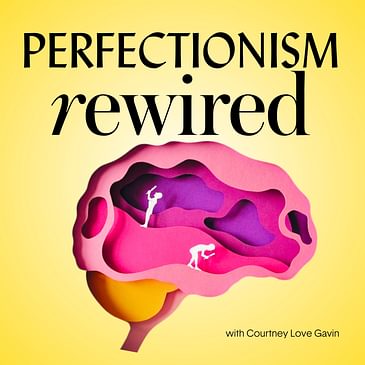You know logically it’s not *your job* to fix everything in your orbit yet the moment anything goes awry, you feel like the outcome is all on your shoulders. Perhaps you say “yes” to practically everything you’re asked to do…but feel kinda resentful later. An overactive sense of responsibility can be a tough habit to unlearn when you CARE deeply + are teetering on the edge of burnout. Learn how to easily distinguish between care-ing and carrying aka overloading yourself. Plus practical tips you can use immediately for ending codependency with kindness and being empathetic + present without getting bogged down by other people's emotions.
If you’re committed to being stronger, happier, braver, more resilient and want in-depth personalized support rewiring your perfectionism, The Accelerator 1-1 coaching is for you! Get started today at https://courtneylovegavin.com/accelerator
Listen to the full episode to hear:
- The crucial distinctions between caring for people and carrying their load (codependency)
- How an overactive sense of responsibility impacts your peace, presence and growth
- CLG's journey to letting go control and not taking it all on
- Practical tips you can use (today!) to lighten your load and enhance energy levels
Highly Credible Sources Referenced in This Episode:
- Bohns, V., Newark, D., & Boothby, E. (2018, October 8). When do We Feel Responsible for Other People’s Behavior and Attitudes? https://www.researchgate.net/publication/327854931_When_do_We_Feel_Responsible_for_Other_People's_Behavior_and_Attitudes
- Barrett, L. F. (2017). How emotions are made: The secret life of the brain. Houghton Mifflin Harcourt.
- Sugiura, Y., & Fisak, B. (2019). Inflated Responsibility in Worry and Obsessive Thinking. International Journal of Cognitive Therapy, 12(2), 97–108. https://doi.org/10.1007/s41811-019-00041-x
- Tangney, J. P., Burggraf, S. A., & Wagner, P. E. (1995). Shame-proneness, guilt-proneness, and psychological symptoms. In J. P. Tangney & K. W. Fischer (Eds.), Self-conscious emotions: The psychology of shame, guilt, embarrassment, and pride (pp. 343–367). Guilford Press.
- Wiltermuth, S. S., & Cohen, T. R. (2014). “I’d only let you down”: Guilt proneness and the avoidance of harmful interdependence. Journal of Personality and Social Psychology, 107(5), 925–942. https://doi.org/10.1037/a0037523
Perfectionism is very powerful. But only if you know how to leverage it. For more on optimizing your perfectionism go to courtneylovegavin.com
Get the BEST insights from today's episode + time-stamped show notes by subscribing to The Perfectionist Guide newsletter. To access + subscribe go to: https://courtneylovegavin.com/newsletter




